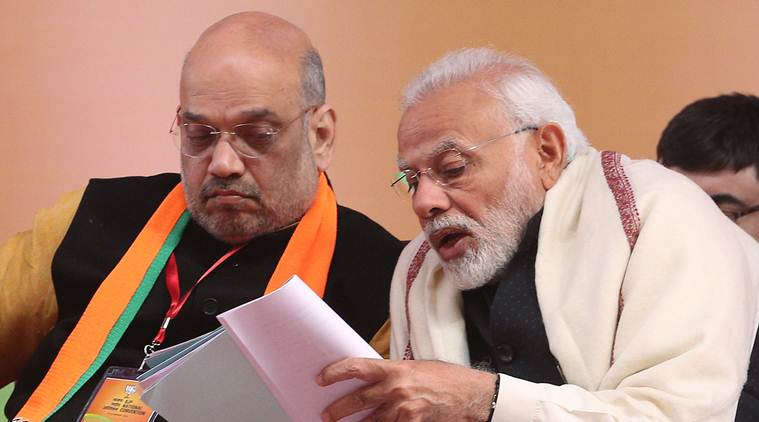The diplomats have publicly maintained that the CAA is an “internal issue”. However, when The Indian Express spoke to ambassadors and diplomats from at least 16 countries, across all continents, over the last few days on the new law and the protests, they expressed “concern” at the situation.

The other key takeaway was this: The government held several briefings for them on various issues it had described as “domestic” — Pulwama attack, Balakot airstrike, revocation of Article 370 in Jammu and Kashmir, and even the Ayodhya verdict. But it has not briefed them even once on the CAA and its ramifications.
“The Indian government briefed us on Kashmir and even the Ayodhya verdict although it maintained that they were domestic issues. But they did not bother to brief us on the CAA, which has an international dimension to it — after all, it talks of three of India’s neighbouring countries in the region,” an ambassador from a G-20 country said.
The new law grants citizenship to Hindus, Sikhs, Buddhists, Christians, Jains and Parsis — but not Muslims — who entered the country from Pakistan, Bangladesh and Afghanistan until December 31, 2014.
The diplomats, who include representatives from G-20 and P-5 groupings, and neighbouring countries, spoke on the condition of anonymity because the matter is “sensitive” and any attribution “may impact” bilateral ties.
They recalled that through 2019, the Ministry of External Affairs (MEA) held several briefings, mostly after Pulwama-Balakot in February-March, followed by Kashmir from August to October — and, to their surprise, even once on the Supreme Court’s Ayodhya verdict.
Story continues below this ad
While bilateral conversations have happened, they said there hasn’t been any attempt to brief them together, or in batches, as was the practice in the other cases. They said some written material, mostly in the form of FAQs on the CAA, have been shared with embassies.
In such a situation, most of these diplomats have concluded that the protests were not limited to the Muslim community. They are now trying to get a sense of whether the government is “bothered” by the international criticism against the law.
On the ground, the first major diplomatic fallout of protests against the CAA were cancellations of visits by Bangladesh’s Foreign and Home ministers, and Japanese Prime Minister Shinzo Abe.
Many foreign diplomats feel that Prime Minister Narendra Modi may be responsive to international criticism, but they are not sure about Home Minister Amit Shah. “The international press is being read by our headquarters, and they have been asking us about how much political and diplomatic risk can the Modi government take,” one of the diplomats said.
Story continues below this ad
Diplomats across continents say the unflattering images and articles about the protests and the government crackdown in the foreign press have made it harder for India’s “friends”, as many in their countries are questioning the government’s commitment to “shared values”.
Recently, External Affairs Minister S Jaishankar cancelled a meeting with a top US Congressional delegation to avoid meeting Pramila Jayapal, who has been critical of the government’s move in Kashmir. US Presidential candidates Elizabeth Warren and Peter Buttigieg have supported Jayapal, a Chennai-born Indian-American Congresswoman.
“The government is making it tougher for its friends to defend it… at this rate, it is losing friends in places where it had bipartisan support earlier,” another diplomat said.
 A demonstration against the CAA and NRC near the Red Fort in Delhi. (Express Photo: Amit Mehra)
A demonstration against the CAA and NRC near the Red Fort in Delhi. (Express Photo: Amit Mehra)
“With each passing day, the government’s position is getting weakened, as these images are not going away. And the action against the protesters and the latest reports of torture and intimidation are giving more credence to the view that the government is intolerant of criticism and dissent,” an ambassador from a European country said.
Story continues below this ad
Last week’s incidents of a German student and a Norwegian tourist being sent back for participating in the protests and violating visa rules have added to the unease. “It doesn’t speak well of the world’s largest democracy,” a diplomat from a G-20 country said.
So far, however, only Bangladesh and Malaysia have publicly criticised the CAA, although many other countries, including the US, UK, France and Australia, issued travel advisories for their nationals.
Bangladesh Foreign Minister A K Abdul Momen said the law could weaken India’s character as a secular nation. Malaysia’s Prime Minister Mahathir Mohamad said “people are dying” because of the law. New Delhi was quick to reject the comments as “factually inaccurate”.
The US, meanwhile, has been cautious, with Secretary of State Michael R Pompeo saying that it “cares deeply about protecting minorities and religious rights” and “honours Indian democracy”.
Story continues below this ad
The State Department spokesperson had earlier urged India to “protect the rights of its religious minorities” in keeping with its “Constitution and democratic values”. That was after the US House Foreign Affairs Committee said that any religious test for citizenship undermines pluralism.
The UN High Commissioner for Human Rights said the law is “fundamentally discriminatory” and appears to “undermine the commitment to equality”.
India’s “friends”, however, have largely stayed the course. French envoy Emmanuel Lenain and Russian deputy chief of mission Roman Babushkin described the law as domestic matter.
For the moment, though, a diplomat, who has been in India for about three years, said the “feel-good” factor about the re-elected government has “vanished”. “Early this year, New Delhi was able to garner a great deal of support from the international community after the Pulwama terror attack… They played along with the Kashmir move, too, although some leaders like (Angela) Merkel and (Emmanuel) Macron made nuanced comments, underlining the human rights situation. But, with this citizenship law and the protests, the feel-good factor of the ruling party getting 303 seats has vanished,” the diplomat said.

 Many foreign diplomats feel that Prime Minister Narendra Modi may be responsive to international criticism, but they are not sure about Home Minister Amit Shah. (Express file Photo By Amit Mehra)
Many foreign diplomats feel that Prime Minister Narendra Modi may be responsive to international criticism, but they are not sure about Home Minister Amit Shah. (Express file Photo By Amit Mehra)
 A demonstration against the CAA and NRC near the Red Fort in Delhi. (Express Photo: Amit Mehra)
A demonstration against the CAA and NRC near the Red Fort in Delhi. (Express Photo: Amit Mehra)





